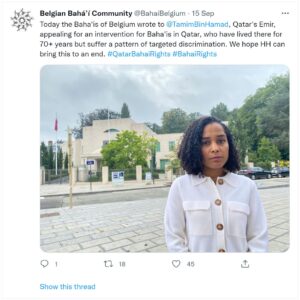16 Sep A FEW WEEKS BEFORE THE WORLD CUP, AN APPEAL IS MADE TO THE EMIR OF QATAR TO PUT AN END TO RELIGIOUS DISCRIMINATION AGAINST THE BAHÁ’IS
 BRUSSELS – 16 September 2022 – The Baha’i Community of Belgium yesterday morning delivered a letter addressed to His Highness Sheikh Tamim Bin Hamad Al Thani, the Emir of the State of Qatar, expressing the concerns of the Baha’is of Belgium regarding the discrimination, restrictions, and human rights violations which have been suffered by their co-religionists in Qatar for decades, and asking him to intervene on behalf of the Baha’is in his country.
BRUSSELS – 16 September 2022 – The Baha’i Community of Belgium yesterday morning delivered a letter addressed to His Highness Sheikh Tamim Bin Hamad Al Thani, the Emir of the State of Qatar, expressing the concerns of the Baha’is of Belgium regarding the discrimination, restrictions, and human rights violations which have been suffered by their co-religionists in Qatar for decades, and asking him to intervene on behalf of the Baha’is in his country.
The letter was hand-delivered to the Qatari embassy in Brussels by a representative of the Baha’is of Belgium.
The action was taken after noting the increasing discrimination and restrictions against the Baha’i community in Qatar. Millions of Baha’is live in almost every country in the world and work for the unity of humanity and the unity of religions.
“For several years we have observed an alarming pattern of discrimination and human rights violations against Bahá’ís in Qatar,” says Annemie Vanormelingen, representative of the Bahá’ís of Belgium. “Transmitting these concerns to the Emir of the State of Qatar, in writing, shows the seriousness of this moment. We risk seeing the elimination of another religious minority in a Middle Eastern country. This is why all the Bahá’ís of Belgium hope that His Highness, the Emir, will be able to intervene on behalf of their co-religionists before they are expelled from his land.”
Bahá’ís have been resident in Qatar for more than 70 years, even before the State of Qatar became independent, but despite this long presence they have experienced decades of discrimination.
For many years, the Qatari authorities have systematically attempted to expel Bahá’ís from Qatar, including blacklisting them and issuing expulsion orders, and denying them business licences or work permits even when they have already received job offers from Qatari companies. A number of Bahá’ís have also been denied “certificates of good conduct” – even though they have done nothing wrong – which then disqualifies them from access to employment or other aspects of life.
Some Bahá’ís in Qatar have even faced unspecified and false criminal and national security charges. Blacklists and expulsions have separated married couples and families and forced some Qatari citizens to leave their home countries to avoid being separated from their non-Qatari spouses.
Qatar’s Baha’is have also been barred from working in so-called “sensitive” sectors, particularly education, despite having worked and contributed for decades in the medical sector, banking, engineering, sports, media, entrepreneurship, public policy, oil and gas, crafts and trades, justice, health and security, and the arts.
The discrimination bears a striking resemblance to the treatment faced by Bahá’ís in Iran and Yemen. Most of the Baha’is in Qatar who have been blacklisted and expelled were born and raised in the country, in families that have lived there for generations and have known no other home.
A 2019 report by the UN special rapporteurs on minority issues and freedom of religion or belief said Qatar was “undermining human rights in the areas of religion and culture”, referring to the situation of Baha’is, in “what appears to be a disturbing pattern of discrimination against individuals on the basis of their religion or belief”.
The Special Rapporteurs added that they were “particularly concerned about the deportation and blacklisting of individuals on the basis of their membership of a minority religion”.

